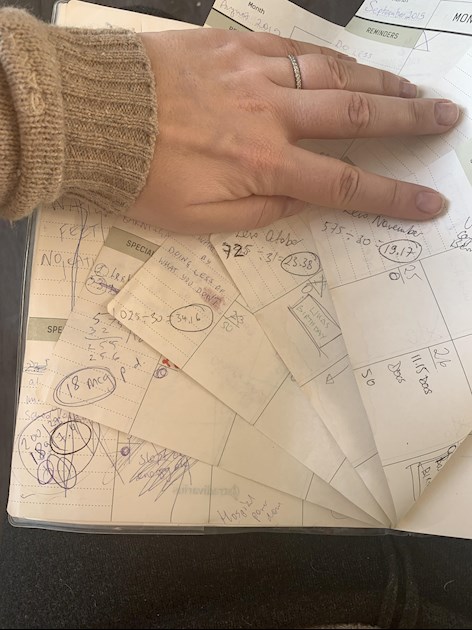I have been taking levothyroxine as I have been needing it since about the start of this year. If I had hyper symptoms I lowered my dose. If I was feeling weak I increased my dose. I started keeping a diary of how much Levo I take daily since July this year. This is the result - in circles, starting with July. The result is an average of total amount of levo divided by days in the month.
I tended to take a 25 or a 50 or would cut a 75 pill in half.
In July I tried to get off levo and became hypo-symptomatic in about 3 weeks. I seem to react quite quickly to taking levo and significant dose changes take about 3-5 days to really get noticed.
Last year I was taking 75 or 100 daily. I first started taking Levo in about July 2017, which was 5 months after my second baby’s birth. My TSH was over 100 and I was below lab range for T4, when I started taking a dose of 50 going up to 75 and then 100. My TPO antibodies were 136 when first tested (normal >35).
The biggest impact on how much levo I need, in hindsight - has been presence or absence of significant stress and significant travel with children, which, unsurprisingly I find pretty stressful.
I eat a normal diet, with gluten and sugar and salt and alcohol and dairy and meat. We try to be healthy, but like any busy family with kids, there is the odd pizza and the like here and there.
My two supplements are magnesium (4-500mcgs a day) and a sea kelp jelly, rich in iodine. We have just started making kombucha at home and are fond of a kefir here and there, but not fanatical about it. I drink some caffeinated tea but coffee is an absolute no-no as I tend to get hyper symptoms within hours and feel very unwell.
I have already written before about trying to cut down excess physical activity and being quite strict about keeping and staying warm. I try to rest when I feel tired, which is always a battle with kids around, but I try to prioritise it.
I’m particularly excited to see a downward trend in the colder months, as I thought this would impact the need for levo a lot more than it has. So stress, particularly being alone with two small kids, and travel really seem to be the top triggers for me in particular.
Just sharing my experience.
